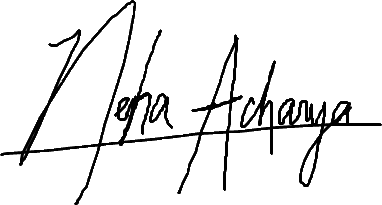Founder's Letter
Dear future AMWHO participants,Sincerely,

Neha Acharya-Harless, MPH
Founder
WHAT IS AMWHO?
WHAT IS MODEL-WHO?
Concept
Model-WHO is a conference simulation of the World Health Assembly (WHA), the annual global health policy making forum of the World Health Organization (WHO). Students who register for AMWHO conferences are assigned either a WHO Ambassador, NGO Representative, Pharmaceutical Company, or Media Correspondent position, and must represent their role accurately throughout the course of the three-day conference weekend.
Delegates are split into five regional blocks: African Region (AFRO), Americas Region (AMRO), Eastern Mediterranean Region (EMRO), European Region (EURO), and Western Pacific & Southeast Asian Region (WPRO/SEARO). Prior to the conference, delegates research their position’s stance on the global health policy theme, and create resolutions with fellow participants. On the last day, all regions convene to debate their completed resolutions, emulating the true simulation of the WHA.
WHO Ambassadors
A WHO Ambassador is an individual representing a diplomat to one of the 193 Member States to the World Health Organization. Ambassadors have full voting rights within the conference, with a sole goal to pursue their nation’s health interests in the Assembly. These delegates are expected to conduct detailed, in-depth research prior to the conference on their nation’s position with respect to the conference theme, their allies and enemies, and how their nation would react to different proposals. Their main objective is to use the skills of negotiation and diplomacy to create sound, realistic, and effective resolutions with fellow delegates, who very well may hold differing opinions.
NGO Representatives
Delegates representing an NGO must embody the ideals, motives, and objectives of their organization. As an NGO Representative, they will receive a personalized schedule during the conference that allows them to rotate among all regional rooms, and debate with any WHO Ambassador. They must understand all resolutions being formed, with a primary focus in ensuring that each policy holds the ideals of their organization. Ultimately, these delegates provide seals of approval, or written acceptances of a resolution, before all resolutions head to the final plenary. They do not have voting rights, but are able to formally debate.
Media Correspondents
Media Correspondents are non-voting delegates that hold a unique role in the AMWHO International Conference. They perform research prior to the conference on their company views and biases around the conference theme, but their primary objective is to capture the news and highlights of the conference through video and blog form. They aim to provide news in the same journalistic manner of the company that they represent. Thus, these delegates must be well-versed in how to provide the news in respectful, but accurate way. Media Correspondents will receive assistance in capturing stories, conducting interviews with the voting and non-voting delegates, and presenting the exciting and often controversial happenings in other regional blocks.
Pharma & Tech Representatives
Pharmaceutical Representatives, also non-voting delegates, are the essential industrial players in global healthcare, as they manage, research, and develop life-saving medications. Pharma will become proficient in the art of business diplomacy with the major objective of advancing their companies’ interests while maintaining a positive public image. Representatives come to better understand the challenges of multi-million-dollar drug development, as well as the benefits of successfully marketed medications and having production lines ready to meet the needs of the global community.
Tech Representatives, also non-voting delegates, represent their technology industries in varied ways as it relates to the conference theme. Still, these players are critical to achieving partnerships with WHO Ambassadors, NGO Representatives, and Pharmaceutical Companies, and thus delegates must be well-researched on their company and its core values as it relates to the theme.
UN Agencies
UN Agency delegates consist of specialized agencies (such as the World Bank) and Funds and Programmes (such as UNFPA). Specialized agencies are independent national organizations brought into relationship with the UN through negotiated agreements. The Funds and Programmes work below the banner of the UN, but are controlled by distinct intergovernmental bodies and have mostly separate finances. UN Agencies are non-voting delegates, meaning that they cannot vote on procedural or substantive matters.
The role of UN Agencies is to be experts in their particular programmes and to showcase the work that they are doing (ensuring ongoing funding from Member States). Agency representatives can achieve this through interventions using appropriate parliamentary procedures (UN Agencies are usually given final word, following Member States and NGOs) and through technical briefings. As the agencies are bound to the UN, they are somewhat restricted in what they can say, and cannot be seen lobbying Member States; however, Agency representatives could see through their objectives via less direct routes.
